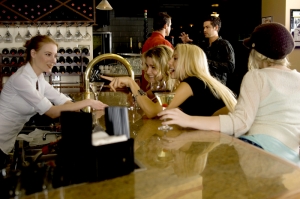 Every service professional dreads having to cut off a belligerent customer; it’s almost a rite of passage that every server or bartender must go through in their career. But, what happens if you need to refuse service for another reason? Who can you legally refuse to serve or ask to leave? Not only are the laws regarding right to refuse service complicated and varied by location, but private businesses can have their own additional rules and regulations. Complicated as it can be, it’s important that you know your rights. Beverage alcohol is a regulated substance and society has placed a significant responsibility on the server to dispense it properly.
Every service professional dreads having to cut off a belligerent customer; it’s almost a rite of passage that every server or bartender must go through in their career. But, what happens if you need to refuse service for another reason? Who can you legally refuse to serve or ask to leave? Not only are the laws regarding right to refuse service complicated and varied by location, but private businesses can have their own additional rules and regulations. Complicated as it can be, it’s important that you know your rights. Beverage alcohol is a regulated substance and society has placed a significant responsibility on the server to dispense it properly.
First, let’s get the obvious out of the way. In Nevada, you have a legally protected right to evict from your premises, “anyone who acts in a disorderly manner, or who destroys the property of any such owner or keeper, or who causes a public disturbance in or upon such premises.” (Source: Nevada Legislature).
Given this, there are a number of legitimate situations in which an establishment can refuse service, including, but not limited to:
 Patrons who are excessively rowdy or harassing other customers.
Patrons who are excessively rowdy or harassing other customers.- Binge drinkers, over-consumers and already intoxicated individuals.
- Patrons that would overfill legal capacity if let in.
- Patrons accompanied by large groups of non-paying customers who will fill up excessive space that could be used by other paying customers.
However, beyond this things start to get tricky. As a matter of law, you must always respect people’s civil rights. It is against the law to deny service based on protected classes such as “race, color, religion, national origin, disability or sexual orientation.” (Source: Nevada Legislature). Additionally, Nevada law mandates that you cannot refuse service to a person who requires the assistance of a service animal such as a seeing-eye dog. (Source: Nevada Legislature). Outside of any type of discrimination, within a private business establishment such as a bar or casino, it is up to the establishment’s discretion who they do and do not do business with.
Remember, bartenders and servers need to be concerned not only with the behavior or state of their direct customer, but how they can effect or interact with others around them. For example, it could be dangerous to allow a small child to linger in a bar or casino – what if they were knocked over by someone carrying a tray of drinks or caught in the crosshairs of a bar fight? In Nevada, a business that sells alcoholic beverages can be fined for allowing a minor to linger in the building. People have been escorted out of establishments for all types of unique situations including:
- Excessive personal hygiene issues (foul body odor).
- Minors in the company of adult caretakers in a bar or pub area.
- Pregnant women in a rowdy bar or pub area.
What does this mean for you? Always check your employee handbook or company policies regarding refusal of service to see how your employer handles these types of situations. You need to be aware of both company policies and laws specific to your community. You may have to report any disruptive behavior or anything that makes you uncomfortable to a manger before cutting off a patron or asking them to leave. There may even be rules dictating that the person is escorted safely off of the property.
Also, keep in mind that asking a customer to stop drinking or leave is not always good for business. Recently, as reported in the Chicago Tribune in the article, “Pregnant Woman Says She Was Kicked Out of Bar,” there was a case in Illinois involving a pregnant woman (who was not consuming liquor) being asked to leave a bar because she was viewed as a potential liability. The woman left, as asked; but, she was embarrassed by what had happened. Now, the bar is going through a wave of negative publicity (and a lawsuit may follow). A good rule of thumb is to always use your best judgment in doing what you can to maintain a positive and safe atmosphere.
Have you ever refused service or asked someone to leave? What happened?
Resources:
© 2011 National Hospitality Institute®, TAM® of Nevada
 Servers, bartenders and anyone else responsible for service and sale of alcoholic beverages has a very important job on their hands… knowing how to spot an inebriated guest, and knowing when to intervene. As a server, it’s important to make sure that your guests and patrons are having an enjoyable time, are served exactly what they ordered, and remain respectful of the establishment and others. On top of all of this, it’s imperative to watch for any warning signs that they may be intoxicated. As such, a bartender or server should always be closely monitoring their guests.
Servers, bartenders and anyone else responsible for service and sale of alcoholic beverages has a very important job on their hands… knowing how to spot an inebriated guest, and knowing when to intervene. As a server, it’s important to make sure that your guests and patrons are having an enjoyable time, are served exactly what they ordered, and remain respectful of the establishment and others. On top of all of this, it’s imperative to watch for any warning signs that they may be intoxicated. As such, a bartender or server should always be closely monitoring their guests.



